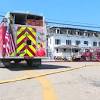Don't Let COVID-19 Fear Keep You From Seeking Medical Care


The University of Kentucky Public Relations & Strategic Communications Office provides a weekly health column available for use and reprint by news media. This week's column is by Dr. Larry Goldstein, chairman of University of Kentucky’s Department of Neurology and the Co-Director of the Kentucky Neuroscience Institute.
LEXINGTON, Ky. (May 18, 2020) — The fear of contracting COVID-19 is keeping many people at home who should be coming to the Emergency Department for life-threatening conditions. Emergency departments, however, have been reorganized to isolate patients with suspected or known COVID-19 to protect those who are not infected. Yet, in the face of the pandemic, hospitalizations for stroke have decreased dramatically all over the world, including in Kentucky.
Avoiding or delaying seeking emergent help can have drastic consequences because effective stroke treatments are available, but need to be started soon after the symptoms begin. It is important not to dismiss even transient symptoms because they are a warning that a major stroke may occur over the next hours or days.
There are emerging reports suggesting that COVID-19 infection, even among young adults and those with no COVID-19 symptoms, can increase the risk for a major stroke. There is now evidence that COVID-19 can affect the linings of blood vessels and the regulation of the body’s blood clotting system. These changes can lead to a clot that blocks an artery supplying the brain, which can cause irreversible damage if not quickly treated.
Regardless of your age, it is important to know the signs of stroke, and to call 911 immediately if you think you are having a stroke or if you see these signs in someone else. The acronym BE FAST can help remember some of the more common signs of stroke, and it helps remind you to act fast by calling 911 immediately.
BE FAST stands for a sudden onset of problems with Balance or leg weakness, problems with the Eyes such as visual loss or double vision, Facial droop, Arm weakness, Speech that is slurred or otherwise changed- Time – the need to call 911 immediately). It is also important to know which hospitals in the area are stroke certified. A hospital may be designated as an Acute Stroke Ready Hospital, a Primary Stroke Center, a Thrombectomy-Capable Stroke Center, or the most advanced certification of a Comprehensive Stroke Center. Each level of certification requires compliance with strict criteria to receive and maintain. Remember, if a stroke does occur, time is essential. Do not ignore the symptoms – you or a loved one may be spared permanent disability by acting quickly.


 United States
United States Argentina
Argentina  Australia
Australia  Austria
Austria  Brazil
Brazil  Canada
Canada  Chile
Chile  Czechia
Czechia  France
France  Germany
Germany  Greece
Greece  Italy
Italy  Mexico
Mexico  New Zealand
New Zealand  Nigeria
Nigeria  Norway
Norway  Poland
Poland  Portugal
Portugal  Sweden
Sweden  Switzerland
Switzerland  United Kingdom
United Kingdom 

























